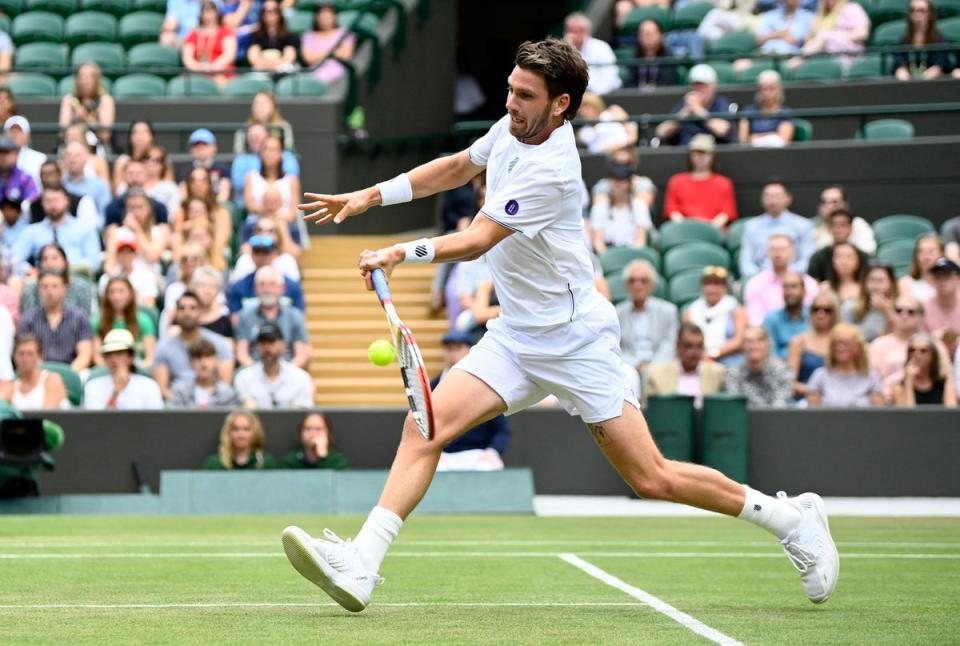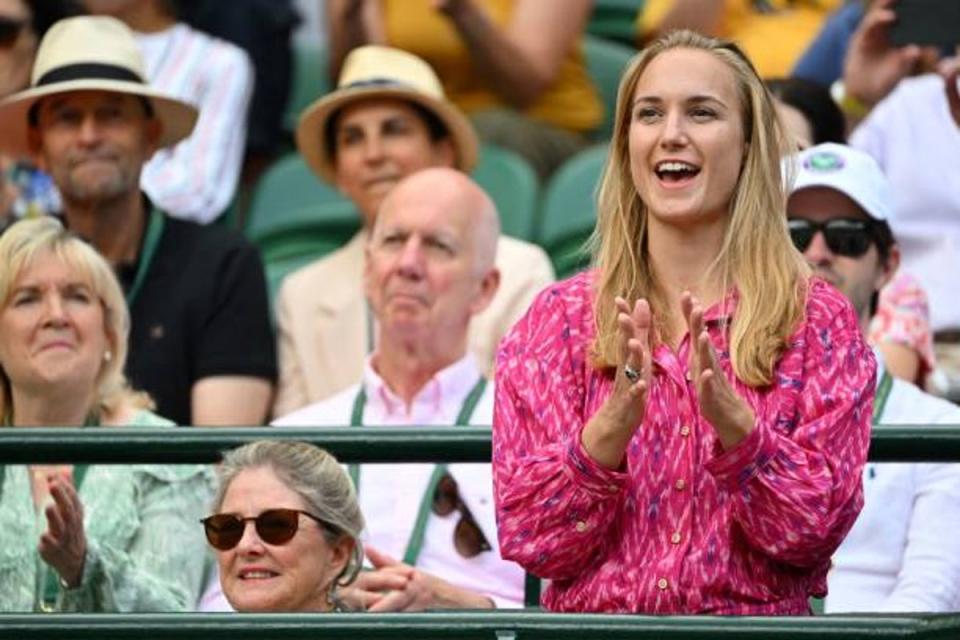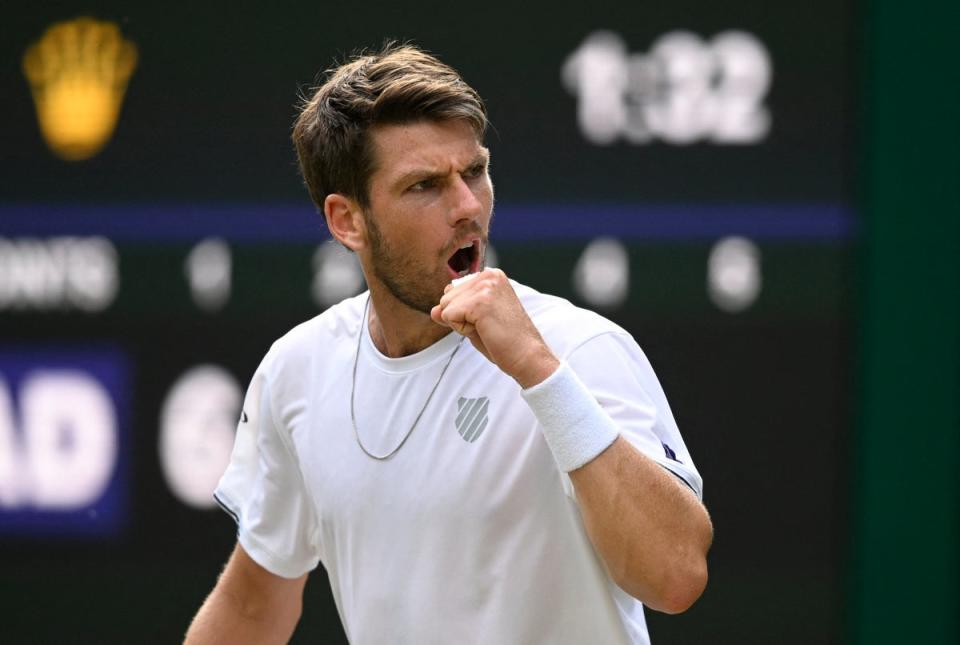Cameron Norrie-mania — from practising with a sawn-off squash racquet to the moped accident that changed his life

He’s in the final eight, the last Brit standing and he’s a Londoner (well, sort of).
Cameron Norrie, 26, is Britain’s hope for a Wimbledon win this year after an impressive victory on Sunday against 30th seed Tommy Paul, whom he beat in straight sets.
South African born Norrie, who now lives in Putney, is the first British man to reach the singles quarter-finals since Andy Murray in 2017 and first British player since Johanna Konta in 2019. And the good news is, he’s feeling confident despite never having got this far in a tournament before. “A lot of the top players get better as the tournament progresses,” he said. “I feel like that with myself, for sure. I’m improving and my level is getting better. I’m definitely a little bit more calm in the bigger matches. It’s nice to do it that way round.”
As he takes on Belgian David Goffin in his first Grand Slam quarter-final today, he can rely on the support of the SW19 crowds, something he says has helped him this far. "I think from the first round everyone has been behind me and supporting me," he said. “It’s shown in tough moments in the matches - especially serving for the match there. There were a lot of things going around my head but I managed to stay calm and do it."
Ahead of the big game, we take a look at Norrie’s journey to tennis success.
Born in Johannesburg to two sporty microbiologist Brits
Cameron Norrie was born in Johannesburg, South Africa in 1995 to a Welsh mother and Scottish father but grew up in Auckland, New Zealand which is where his parents and sister, Bronwen, still live. The family relocated in 1998, when Norrie was just three, after their neighbour was the victim of a burglary at gunpoint.
His parents, both microbiologists, but also keen sportspeople always supported Norrie’s tennis talent. In fact, it was his mum Helen, an accomplished long-distance runner in her youth, who first introduced him to the game. She fashioned a tennis racket from a sawn-off squash racquet so he could hit a ball around in the driveway of the family home when he was growing up. As a junior he represented New Zealand until age 16 and his mum would drive him to 6.15 am practice sessions. His dad David also had sporting prowess and is a former British universities No 1 squash player.
Despite his international background Norrie says he feels British and loves it in the UK. “I consider myself British,” he said. “Both my parents are British. My mum is Welsh and my dad is Scottish, with a filthy Scottish accent. My background is from various places but I’m living here, based here. I feel good coming back here, practising with the younger Brits.
“I love rugby, cricket. I’m feeling pretty at home. It’s great to follow all the sports here.”

He moved to London alone aged 16 and suffered burn out
Norrie reached No 10 as a junior in New Zealand but a lack of funding pushed him to move to the UK. His parents Helen and David paid for their son’s expenses and overseas tournaments. “Cameron got a bit of money, but not much,” Helen said in 2017 “And basically we’ve done this all ourselves with Auckland Tennis backing us.”
So in 2011 he moved to London, where he lived for three years while playing in junior tournaments. But even at that young age he realised he wasn’t ready to give everything to the sport. “I don’t think I was mature enough to cope,” he said. “I got burnt out and felt like I needed some reality and stability back in my life.”
He took a tennis scholarship at a Texan university, where he studied sociology which he took just as seriously as the training because he didn’t want tennis to be his sole focus.
It was while he was studying at Texas Christian University (TCU) that Norrie was injured in a moped crash after a “big night” of drinking. He said: “We all had a pretty big night and definitely a couple too many. I decided to drive my moped to my girlfriend’s place. I didn’t even make it 20 metres when I ended up falling off and bashing my chin on the steering wheel. I left the moped on the ground surrounded by blood everywhere.”
He needed six stitches and failed a concussion test which meant he wasn’t permitted to play in the Dallas tournament in the ATP Challenger. His coach put him on a “final warning”. “I remember it so clearly; telling us that I could have easily been killed and I shouldn’t have been sitting here with the boys,” he said.
“It hit me hard. . . I thought to myself, ‘What the f*** am I doing? Going out every Thursday, Friday and Saturday for what?’ From then on I decided I wanted to play pro tennis and made an oath not to waste one second on the court, and I definitely made better decisions off the court too. The whole situation made me more grateful for the opportunity I had, and I’m glad I had that moment early on in my career when it wasn’t too late.”
The incident changed his life and super-charged his drive. He said it was “turning point” and “in the end it was a positive thing and it definitely kicked me into gear.”
Turned pro in 2017 and now he’s the last Brit left in Wimbledon
Only eight months after turning pro Norrie won his first Davis Cup match against the then world No.23 Roberto Bautista-Agut. Davis Cup captain John Lloyd described it as: “one of the most impressive debuts of all time”.
He trained with Andy Murray in 2017 whom he called a “great role model” but now the tables have turned. After his most recent win Murray said of Norrie: “I’d be lying if I said that I called that to be honest. However, I have spent a decent amount of time around him and practised with him quite a lot and he works extremely hard.
“I think he’s a great example for not just British players but all tennis players to look at and go, if you put the effort in day in, day out and properly dedicate yourself to the sport, have an attitude like he does, it can take you a long, long way.”

He lives in East Putney and is dating an American designer
Norrie has a “compact but immaculate” flat in East Putney, according to the Times. He also doesn’t own a car and prefers to cycle around the capital.
His girlfriend is Louise Jacobi, an American textiles designer who studied at London’s prestigious Central St Martins. She used to work for Calvin Klein and now works as a textiles consultant for New York-based Please Don’t Touch.
She posts many pictures of the pair on her Instagram and while it’s not known how they met, they went public on social media in 2019.
He’s gluten free and has a weakness for chocolate
As you’d expect from a tennis player, Norrie eats pretty healthily but isn’t super strict with himself, believing that enjoying your meal is as important as calorie counting. “Tennis players like to eat dinner,” he said. “It’s the way we wind down and relax.”
Although he’s not a dab-hand in the kitchen. He’s good “with toast” he recently told The Times and having lived in New Zealand, “solid” on the barbecue.
For breakfast he has eggs and toast and a South African breakfast cereal called ProNutro, which is wholegrain with chocolate-flavoured maize and soya. “It’s like baby food and I love it.”
Because he’s gluten-free and coeliac he doesn’t eat things like pizza or burgers but he can’t resist chocolate. “Chocolate is my weakness,” he said. “But if I cut it out all together, I find myself fighting the temptation and then giving in, killing a whole bar in one go . . . and then feeling bad about it. So while I try to make good decisions with my food all the time, I also allow myself a treat.”

He’s a lightweight
Norrie never celebrates a win with a drink (or drowns his sorrows from a loss) which means that when he does booze he doesn’t need much. “It’s good because it means that when we do drink we spend a lot less,” he said.
He can tell his coach anything
Norrie has had the same coach, Facundo Lugones, since he went pro and really trusts him. “He really gets the best out of me,” he said. “It is nice to have someone who knows you well off the court. I can tell him anything. I think it is important you can have someone you can speak openly with about how you are feeling.”

 Yahoo Sport
Yahoo Sport 





































